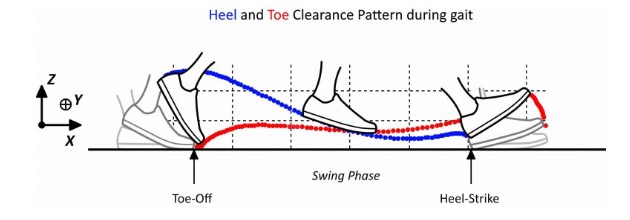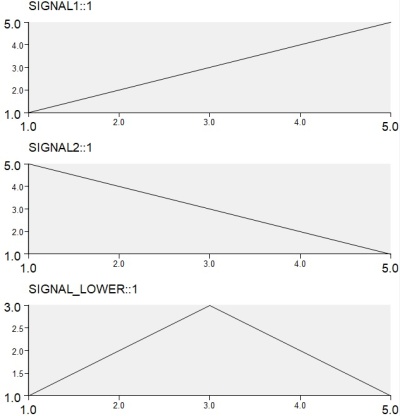Mathematical Operators: Difference between revisions
| (19 intermediate revisions by the same user not shown) | |||
| Line 1: | Line 1: | ||
==Plus== | |||
NOTE: Pipeline command parameters use + as delimiter | |||
If the user wants to use an expression containing a + in a command parameter that allows multiple signals, Visual3D will likely interpret this plus sign incorrectly. | |||
The workaround is to use a mathematical function add() to express the addition. | |||
:'''add(a,b)''' -- adds two expressions. | |||
==Minus== | |||
==Multiply== | |||
==Divide== | |||
==Power== | |||
==Logical_Or== | |||
: Logical Or | |||
==Logical_And== | |||
: Logical And | |||
==Equals== | |||
:'''= or ==''' - Boolean Operator ''equals'' | |||
Example: Comparing a model metric with a string | |||
:Consider a model metric that is defined as a string. | |||
::'''Set_Model_Metric''' | |||
::! /CALIBRATION_FILE= | |||
::/METRIC_NAME=TEST | |||
::/METRIC_VALUE="TTT" | |||
::''';''' | |||
:Now compare it to the text string "TTT" | |||
::'''Evaluate_Expression''' | |||
::/EXPRESSION=MODEL::METRIC::TEST="TTT" | |||
::/RESULT_NAME=SCOTT | |||
::/RESULT_TYPE=METRIC | |||
::! /RESULT_FOLDER=PROCESSED | |||
:''';''' | |||
:The text strings should be equal so the resulting signal contains a 1 | |||
==Not_Equals== | |||
:'''<> or ><''' - Boolean Operator "Not Equals" | |||
==Using the Adjective NOT== | ==Using the Adjective NOT== | ||
| Line 22: | Line 69: | ||
This command results in *trial2.c3d and *trial3.c3d being active. | This command results in *trial2.c3d and *trial3.c3d being active. | ||
== | ==Less_Than== | ||
Example: | '''<''' Boolean Operator ''less than'' | ||
'''Example''' | |||
:Given two signals | |||
::TARGET::ORIGINAL::RFT1 | |||
::TARGET::ORIGINAL::LFT1 | |||
:Use the Boolean operator < to identify when the Z component of RFT1 is less than the Z component of LFT1 | |||
::'''Evaluate_Expression''' | |||
::/EXPRESSION= TARGET::ORIGINAL::RFT1::Z < TARGET::ORIGINAL::LFT1::Z | |||
::/RESULT_NAME=RFT1_GREATER | |||
::/RESULT_TYPE=DERIVED | |||
::/RESULT_FOLDER=PROCESSED | |||
::''';''' | |||
:The output signal will be 1 when RFT1::Z is less than LFT1::Z and 0 otherwise | |||
'''Example - Foot Clearance''' | |||
:Given the following situation. Heel and Toe clearance are defined by two paths. | |||
:One might consider Foot clearance to be the lower value of the heel and toe clearance values at each frame. | |||
:[[File:heel_toe_clearance.jpg]] | |||
:Here is a simplified test of this | |||
:Make the Global Workspace Active. | |||
:Create 2 signals as follows | |||
:'''Evaluate_Expression''' | |||
:/EXPRESSION=LIST(1,2,3,4,5) | |||
:! /SIGNAL_TYPES= | |||
:! /SIGNAL_FOLDER=ORIGINAL | |||
:! /SIGNAL_NAMES= | |||
:! /SIGNAL_COMPONENTS= | |||
: /RESULT_TYPES=DERIVED | |||
: /RESULT_FOLDERS=PROCESSED | |||
: /RESULT_NAME=SIGNAL1 | |||
:! /APPLY_AS_SUFFIX_TO_SIGNAL_NAME=FALSE | |||
:''';''' | |||
:'''Evaluate_Expression''' | |||
:/EXPRESSION=LIST(5,4,3,2,1) | |||
:! /SIGNAL_TYPES= | |||
:! /SIGNAL_FOLDER=ORIGINAL | |||
:! /SIGNAL_NAMES= | |||
:! /SIGNAL_COMPONENTS= | |||
: /RESULT_TYPES=DERIVED | |||
: /RESULT_FOLDERS=PROCESSED | |||
: /RESULT_NAME=SIGNAL2 | |||
:! /APPLY_AS_SUFFIX_TO_SIGNAL_NAME=FALSE | |||
:''';''' | |||
!create a new signal that is the lower value of the two signals | |||
:'''Evaluate_Expression''' | |||
:/EXPRESSION=(DERIVED::PROCESSED::SIGNAL1<=DERIVED::PROCESSED::SIGNAL2)*DERIVED::PROCESSED::SIGNAL1 | |||
:::+(DERIVED::PROCESSED::SIGNAL2<DERIVED::PROCESSED::SIGNAL1)*DERIVED::PROCESSED::SIGNAL2 | |||
:! /SIGNAL_TYPES= | |||
:! /SIGNAL_FOLDER=ORIGINAL | |||
:! /SIGNAL_NAMES= | |||
:! /SIGNAL_COMPONENTS= | |||
: /RESULT_TYPES=DERIVED | |||
: /RESULT_FOLDERS=PROCESSED | |||
: /RESULT_NAME=SIGNAL_LOWER | |||
:! /APPLY_AS_SUFFIX_TO_SIGNAL_NAME=FALSE | |||
:''';''' | |||
:[[File:heel_toe_clearance2.jpg|400px|Caption]] | |||
==Less_Than_Or_Equals== | |||
! style="text-align:left;" | '''<=''' or '''=<''' Boolean Operator ''less than or equal to'' | |||
Example: | |||
:Given two signals | |||
::TARGET::ORIGINAL::RFT1 | |||
::TARGET::ORIGINAL::LFT1 | |||
: | :Use the Boolean operator <= or the boolean operative =< to identify when the Z component of RFT1 is less than or equal to the Z component of LFT1 | ||
::''' | ::'''Evaluate_Expression''' | ||
:: | ::/EXPRESSION= TARGET::ORIGINAL::RFT1::Z <= TARGET::ORIGINAL::LFT1::Z | ||
::/ | ::/RESULT_NAME=RFT1_GREATER | ||
::/ | ::/RESULT_TYPE=DERIVED | ||
::/RESULT_FOLDER=PROCESSED | |||
::''';''' | ::''';''' | ||
: | :The output signal will be 1 when RFT1::Z is less than or equal toLFT1::Z and 0 otherwise | ||
==Greater_Than== | |||
'''>''' Boolean Operator ''greater than'' | |||
Example: | |||
:Given two signals | |||
::TARGET::ORIGINAL::RFT1 | |||
::TARGET::ORIGINAL::LFT1 | |||
:Use the Boolean operator > to identify when the Y component of RFT1 is greater than the Y component of LFT1 | |||
::'''Evaluate_Expression''' | ::'''Evaluate_Expression''' | ||
::/EXPRESSION= | ::/EXPRESSION= TARGET::ORIGINAL::RFT1::Y > TARGET::ORIGINAL::LFT1::Y | ||
::/RESULT_NAME= | ::/RESULT_NAME=RFT1_GREATER | ||
::/RESULT_TYPE= | ::/RESULT_TYPE=DERIVED | ||
:: | ::/RESULT_FOLDER=PROCESSED | ||
:''';''' | ::''';''' | ||
:The output signal will be 1 when RFT1::Y is greater than LFT1::Y and 0 otherwise | |||
==Greater_Than_Or_Equals== | |||
'''>=''' Boolean Operator ''greater than or equals'' | |||
Latest revision as of 16:04, 5 January 2024
Plus
NOTE: Pipeline command parameters use + as delimiter
If the user wants to use an expression containing a + in a command parameter that allows multiple signals, Visual3D will likely interpret this plus sign incorrectly.
The workaround is to use a mathematical function add() to express the addition.
- add(a,b) -- adds two expressions.
Minus
Multiply
Divide
Power
Logical_Or
- Logical Or
Logical_And
- Logical And
Equals
- = or == - Boolean Operator equals
Example: Comparing a model metric with a string
- Consider a model metric that is defined as a string.
- Set_Model_Metric
- ! /CALIBRATION_FILE=
- /METRIC_NAME=TEST
- /METRIC_VALUE="TTT"
- ;
- Now compare it to the text string "TTT"
- Evaluate_Expression
- /EXPRESSION=MODEL::METRIC::TEST="TTT"
- /RESULT_NAME=SCOTT
- /RESULT_TYPE=METRIC
- ! /RESULT_FOLDER=PROCESSED
- ;
- The text strings should be equal so the resulting signal contains a 1
Not_Equals
- <> or >< - Boolean Operator "Not Equals"
Using the Adjective NOT
NOT can be used with the logical AND and logical OR
Example: Given a workspace containing 3 trials (*trial1.c3d, *trial2.c3d, and *trial3.c3d)
All trials are assigned a TAG labeled WALK
- trial1.c3d is also assigned a TAG labeled BAD
- Select_Active_File
- /FILE_NAME=WALK
- /QUERY=BAD
- ;
This command results in *trial1.c3d being active
- Select_Active_File
- /FILE_NAME=WALK
- /QUERY=NOT(BAD)
- ;
This command results in *trial2.c3d and *trial3.c3d being active.
Less_Than
< Boolean Operator less than
Example
- Given two signals
- TARGET::ORIGINAL::RFT1
- TARGET::ORIGINAL::LFT1
- Use the Boolean operator < to identify when the Z component of RFT1 is less than the Z component of LFT1
- Evaluate_Expression
- /EXPRESSION= TARGET::ORIGINAL::RFT1::Z < TARGET::ORIGINAL::LFT1::Z
- /RESULT_NAME=RFT1_GREATER
- /RESULT_TYPE=DERIVED
- /RESULT_FOLDER=PROCESSED
- ;
- The output signal will be 1 when RFT1::Z is less than LFT1::Z and 0 otherwise
Example - Foot Clearance
- Given the following situation. Heel and Toe clearance are defined by two paths.
- One might consider Foot clearance to be the lower value of the heel and toe clearance values at each frame.

- Here is a simplified test of this
- Make the Global Workspace Active.
- Create 2 signals as follows
- Evaluate_Expression
- /EXPRESSION=LIST(1,2,3,4,5)
- ! /SIGNAL_TYPES=
- ! /SIGNAL_FOLDER=ORIGINAL
- ! /SIGNAL_NAMES=
- ! /SIGNAL_COMPONENTS=
- /RESULT_TYPES=DERIVED
- /RESULT_FOLDERS=PROCESSED
- /RESULT_NAME=SIGNAL1
- ! /APPLY_AS_SUFFIX_TO_SIGNAL_NAME=FALSE
- ;
- Evaluate_Expression
- /EXPRESSION=LIST(5,4,3,2,1)
- ! /SIGNAL_TYPES=
- ! /SIGNAL_FOLDER=ORIGINAL
- ! /SIGNAL_NAMES=
- ! /SIGNAL_COMPONENTS=
- /RESULT_TYPES=DERIVED
- /RESULT_FOLDERS=PROCESSED
- /RESULT_NAME=SIGNAL2
- ! /APPLY_AS_SUFFIX_TO_SIGNAL_NAME=FALSE
- ;
!create a new signal that is the lower value of the two signals
- Evaluate_Expression
- /EXPRESSION=(DERIVED::PROCESSED::SIGNAL1<=DERIVED::PROCESSED::SIGNAL2)*DERIVED::PROCESSED::SIGNAL1
- +(DERIVED::PROCESSED::SIGNAL2<DERIVED::PROCESSED::SIGNAL1)*DERIVED::PROCESSED::SIGNAL2
- ! /SIGNAL_TYPES=
- ! /SIGNAL_FOLDER=ORIGINAL
- ! /SIGNAL_NAMES=
- ! /SIGNAL_COMPONENTS=
- /RESULT_TYPES=DERIVED
- /RESULT_FOLDERS=PROCESSED
- /RESULT_NAME=SIGNAL_LOWER
- ! /APPLY_AS_SUFFIX_TO_SIGNAL_NAME=FALSE
- ;
Less_Than_Or_Equals
! style="text-align:left;" | <= or =< Boolean Operator less than or equal to
Example:
- Given two signals
- TARGET::ORIGINAL::RFT1
- TARGET::ORIGINAL::LFT1
- Use the Boolean operator <= or the boolean operative =< to identify when the Z component of RFT1 is less than or equal to the Z component of LFT1
- Evaluate_Expression
- /EXPRESSION= TARGET::ORIGINAL::RFT1::Z <= TARGET::ORIGINAL::LFT1::Z
- /RESULT_NAME=RFT1_GREATER
- /RESULT_TYPE=DERIVED
- /RESULT_FOLDER=PROCESSED
- ;
- The output signal will be 1 when RFT1::Z is less than or equal toLFT1::Z and 0 otherwise
Greater_Than
> Boolean Operator greater than
Example:
- Given two signals
- TARGET::ORIGINAL::RFT1
- TARGET::ORIGINAL::LFT1
- Use the Boolean operator > to identify when the Y component of RFT1 is greater than the Y component of LFT1
- Evaluate_Expression
- /EXPRESSION= TARGET::ORIGINAL::RFT1::Y > TARGET::ORIGINAL::LFT1::Y
- /RESULT_NAME=RFT1_GREATER
- /RESULT_TYPE=DERIVED
- /RESULT_FOLDER=PROCESSED
- ;
- The output signal will be 1 when RFT1::Y is greater than LFT1::Y and 0 otherwise
Greater_Than_Or_Equals
>= Boolean Operator greater than or equals
